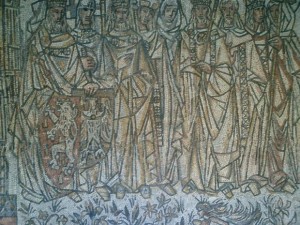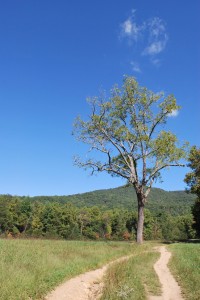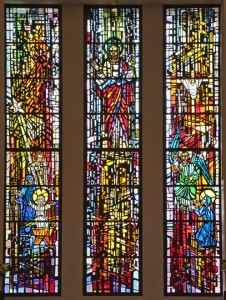One of the reasons I decided to take the Religious Studies course at Western was to learn more about other religions. I felt I had a pretty good handle on Christianity, but I knew little about Judaism and almost nothing about Islam. I had been exposed to a smattering of Buddhism and The Dao, but nothing of Hinduism. I saw great gaps in my background that left me feeling like my foundation of belief was “built on sand.” As I come toward the end of my third semester, I still feel like I’m on shaky ground at times. I am currently well into my fifth class and I am realizing I’ve barely scratched the surface.
A second reason for this endeavor is to find links between the major religions of the world. I firmly believe that there is A God. Only one, not a different one for each religion. Only One, who has been given different names in different languages and is seen from various viewpoints, but still is the same being. I hope to find substantiation for this opinion in my studies. Some of what I’ve learned about Islam backs up that opinion and has been useful to my quest.
One thing is the injunction to stay mindful of God. Muslims pray five times a day to remind them to always be mindful of God. As a Christian, Lent is my mindful time. I’m not saying that I only practice my faith at this time of year, but it is during Lent that I make a commitment to do, or not do, something that will remind me every day of Jesus’ sacrifice. Traditionally, this meant giving up some form of food or drink and I still do that. This year, I am eliminating potatoes from my menus. Sometimes, it’s easy. Just filling my plate at dinner without them. At other times, I must restrain myself from grabbing, just one, french fry from someone else’s fast food meal. In either case, it is a reminder that I am only asked to make small sacrifices for my faith, not the ultimate sacrifice that Jesus made.
A less traditional commitment is to make a promise to do something. What thing isn’t as important as the reason for doing it. It’s just another, more positive, way to stay mindful on our road to Easter. The commitment “to do” is more difficult for me that the don’t. I am reminded of the don’t every time I plan a meal. Remembering the “to do” takes more effort. We are on the fourth week of Lent. Every day, I consider the fact that I did not make a real “to do” promise this year. I thought about several possibilities and dismissed them. So, my Lenten “to do” has been meditating on Lent. What it means and why we celebrate it. I am in belief mode, not action.
In the past, I’ve tried several “practices.” Reading scripture everyday, praying at a certain time every day, dedicating more time to service, but none of those seemed fitting this year. This year, I feel more like a Buddhist. I search within for meaning. I listen for that “still small voice.” This year, I reach for God, not somewhere in the “great beyond,” but inside my own heart and mind.
The weather hasn’t been encouraging enough to tempt me to sit under a tree all day as Gautama did on his search for enlightenment. Just finding a few quiet moments in the nursery school I currently inhabit is a challenge all by itself. I must admit, that there have been days when I failed. On those days, I tell myself that I am only human and begin again.
Easter is almost upon us. It comes, bringing hope and the promise of God’s blessings on us. I am not sure that Jesus’ death was payment for our sins. I am afraid we still pay for those ourselves. But I do think He died to bring us a message of Hope and Forgiveness. The scripture that says “God so loved the world, that He gave His only begotten Son, that whoever believes in Him shall not perish, but have eternal life,” (NAS Bible. John 3:16) Jesus came knowing He would die for His teachings. He made that sacrifice so that we could know His message of love and hope. It is our responsibility to pass it along.
 My oldest daughter said to me one day a week or so ago, “You know how you reach a point that you think you are pretty well educated? Then you find out just how ignorant you really are?” We had both suffered that particular realization that day, on different subjects. It is a really stunningly humbling experience. We cruise along, taking classes, reading books, just living. Then we run against something that should really be common knowledge, but we had never been exposed to it.
My oldest daughter said to me one day a week or so ago, “You know how you reach a point that you think you are pretty well educated? Then you find out just how ignorant you really are?” We had both suffered that particular realization that day, on different subjects. It is a really stunningly humbling experience. We cruise along, taking classes, reading books, just living. Then we run against something that should really be common knowledge, but we had never been exposed to it.



 I guess I’ve been living in some kind of “three monkeys” world, but I had never heard of the “Elf on the Shelf” until this year. After reading the post by
I guess I’ve been living in some kind of “three monkeys” world, but I had never heard of the “Elf on the Shelf” until this year. After reading the post by